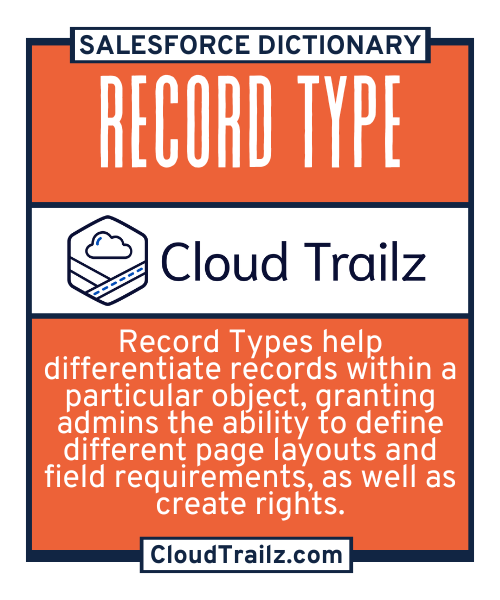
Record Type
Overview
Record Types are a capability across Standard and Custom objects that allow you to create multiple versions of an object. Different versions can have their own field requirements, page layouts, rules, automations etc.
How Are Record Types Used?
This feature is used to provide a different spin on processes that are similar in nature (Upsell, Cross Sell, New Logo Sell, etc). These would all exist in the opportunity object, but their workflows are entirely different.
The feature extends to the UI, automations, and validation rules.
What is the Benefit?
Customization
They help minimize the amount of configuration required to keep your instance clean.
For example a Contact object can have types for vendors, employees, buyers etc, instead of creating multiple objects and sets of fields for the same purpose.
Security
They can be used to exclude/include records from automation and validations. They can be added/removed to/from profiles in order to dictate what records users have the ability to create in the system.
Common Use Cases of Record Types
| Use Case | Roles | Scenario | Outcome |
|---|---|---|---|
| Differentiating Records | End Users | Create varying types of Records |
|
| Record Creation | End Users | Limit ability to create different types of Records |
|
Common Challenges
#1 – Users can’t create records of correct type
Resolution
Ensure the record type is active. Navigate to the affected profiles, then ensure the record types are visible to the profile
#2 – Fields or picklist values are missing
Resolution
If fields are missing, ensure that the correct page layout and lightning page are assigned based on record type. If picklist values are missing, check the affected fields within the record type settings.
Who is Impacted?
Salesforce Users
Utilized to drive front-end experiences for salesforce users. They inform the types of records they can create and the page layouts they see.
Administrators
Admins are responsible for set up and maintenance, including defining page layouts and managing picklist values.
Leadership
Types can influence reporting and analytics. Managers may rely on specific record types to gain insights into performance metrics relevant to different segments of the business.